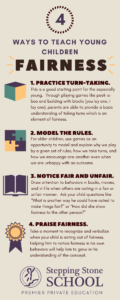Four Ways to Teach Young Children Fairness
That’s How You Play
Three children were sitting around a table playing Candy Land. After a few rounds, Naomi, age 5, picked up the deck of cards and started flipping through them to find the Princess Frostine card which would move her piece to a space close to the finish. Isaiah, age 7, spoke up,
“You can’t do that. You have to take the next card in the pile or it’s not fair.”
“But last time, I got the Gingerbread card and had to move backwards, that wasn’t fair,” whined Naomi.
“But that’s how you play the game. I would have to go back to the gingerbread space if I picked it out too. That’s how you play,” Isaiah stated.
After several moments, “fair play” resumed, but I was intrigued by the exchange.
Fairness, according to Merriam-Webster’s Dictionary, is “marked by impartiality and honesty; conforming with the established rules.” As a concept, fairness is especially challenging for young children to understand. With other traits, like kindness or responsibility, there are concrete actions to observe which may provide a basic understanding of the concept itself. However, fairness is found in the way we treat one another, the way in which we play a game, the way in which live life, etc.

So how do we teach fairness to young children?
- Practice Turn-taking. This is a good starting point for the especially young. Through playing games like peek-a-boo and building with blocks (you lay one, I lay one), parents are able to provide a basic understanding of taking turns which is an element of fairness. For older children, use games as an opportunity to model and explain why we play by a given set of rules, how we take turns, and how we encourage one another even when we are unhappy with an outcome.
- Notice Fair and Unfair. Draw attention to behaviors in books, movies, and in life when others are acting in a fair or unfair manner. Ask your child questions like “What is another way he could have acted to make things fair?” or “How did she show fairness to the other person?”
- Praise Fairness. Take a moment to recognize and verbalize when your child is acting out of fairness. Helping him to notice fairness in his own behaviors will help him to grow in his understanding of the concept.
Fairness may not be taught as easily as other character traits, but with consistency, children will recognize fairness and act fairly towards others.
References:
Fairness Definition found at https://www.merriam-webster.com/dictionary/fair
Innis, G. (2012 , May 16). “Teaching “Fairness” To Preschoolers Is One More Way To Build Character.” Michigan State University Extension. Retrieved on July 15, 2015 from http://msue.anr.msu.edu/news/teaching_fairness_to_preschoolers_is_one_more_way_to_build_character
Kuchinskas, S. (2011). “Teaching Children to Be Fair.” Retrieved on July 6, 2016 from http://www.webmd.com/parenting/features/teaching-children-to-be-fair